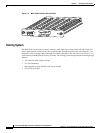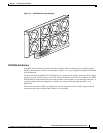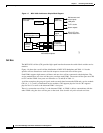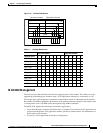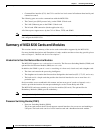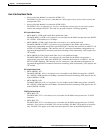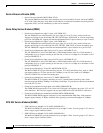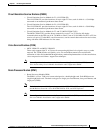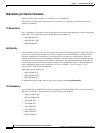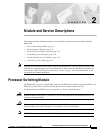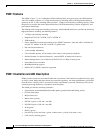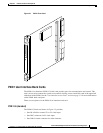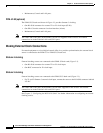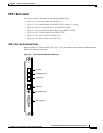
1-16
Cisco MGX 8230 Edge Concentrator Installation and Configuration
Release 1.1.31, Part Number 78-11215-03 Rev. B0, May 2001
Chapter 1 Introducing the MGX 8230
Summary of MGX 8230 Cards and Modules
Redundancy for Service Modules
Service modules can have either 1:1 redundancy or 1:N redundancy.
Refer to the CiscoView user documentation for instructions on using the CiscoView application to
configure redundancy.
1:1 Redundancy
For 1:1 redundancy, place the card sets in adjacent slots and connect the appropriate Y-cable to the paired
ports on the active and standby cards. Applicable service modules are:
• MGX-FRSM-2CT3
• MGX-FRSM-2T3E3
• MGX-FRSM-HS2
Hot Standby
For hot standby, place the card sets in the same shelf and connect the appropriate Y-cable to the paired
ports on the active and hot standby cards. The hot standby card will automatically configure itself to
match the configuration of the primary card. This process may take up to eight minutes. After the
configuration transfer process is completed, the transfer from the primary to the hot standby card takes
less that one second regardless of the number of connections. Any subsequent changes to the primary
card are automatically transferred to the hot standby card configuration so the two cards maintain the
same configuration. Refer to the “Redundancy for Service Modules” section on page 1-16 for
instructions for setting up a redundant pair.
Applicable service modules are:
• MGX-FRSM-2CT3
• MGX-FRSM-2T3E3
• MGX-FRSM-HS2
To determine the hot standby status of the system, use the command dsphotstandby.
1:N Redundancy
For 1:N redundancy, an MGX Service Resource Module-3T3 (MGX-SRM-3T3/C) card set is necessary.
This card set supports 1:N redundancy for the following service modules:
• MGX-AUSM-8T1/B
• MGX-AUSM-8E1/B
• AX-FRSM-8T1
• AX-FRSM-8E1
• AX-CESM-8T1
• AX-CESM-8E1
• MGX-VISM-8T1
• MGX-VISM-8E1



